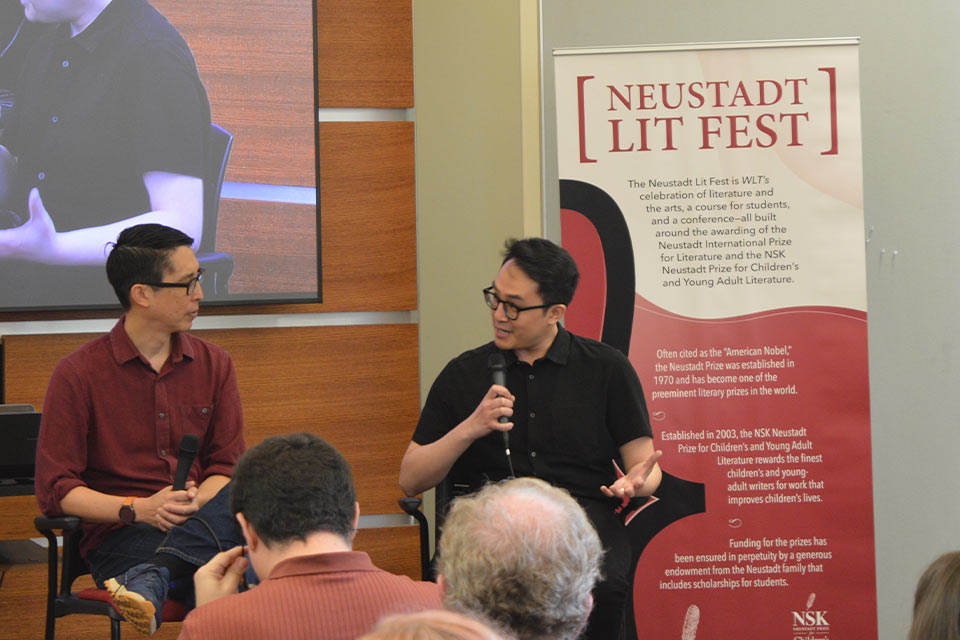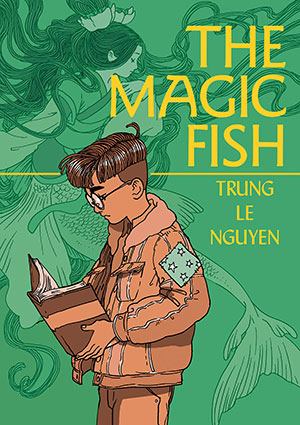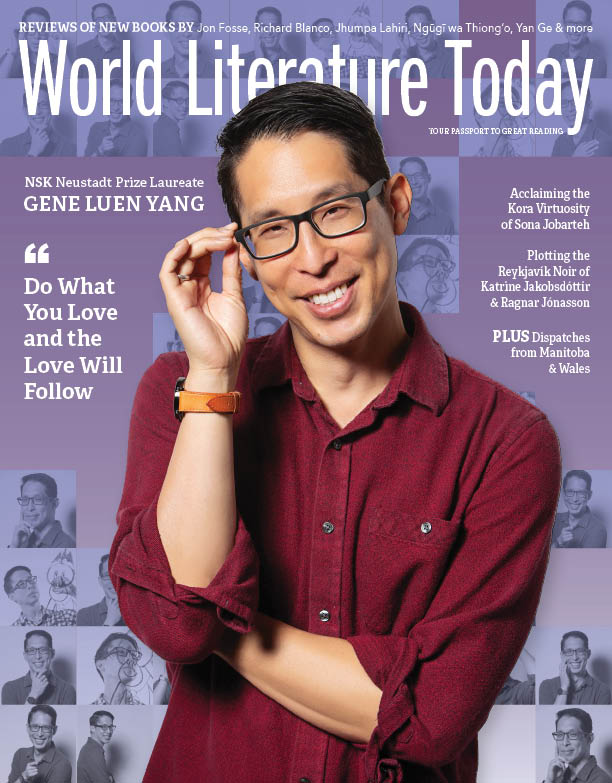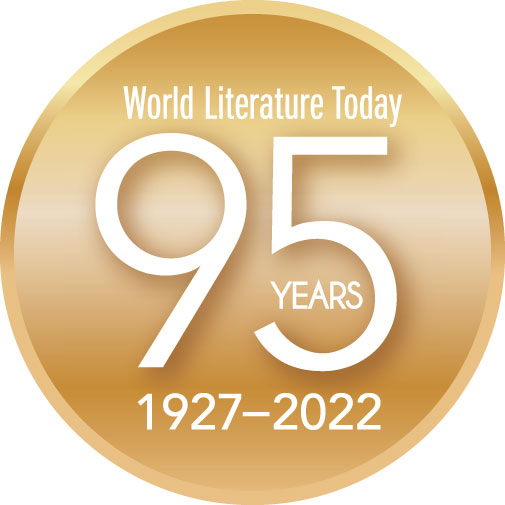The Hybrid Languages of Love and Comics

As he introduced and paid tribute to Gene Luen Yang during the NSK Prize ceremony, Trung Lê Nguyễn, who nominated Yang for the award, reflected on the role of comics in helping bridge cultures, languages, and generations.
While I was here, I was so busy having such a wonderful time—enjoying the company of other writers and everyone who is in charge of organizing the Neustadt Lit Fest—that I completely got lost in it and neglected to prepare for this. So, I am, unfortunately, going to be speaking extemporaneously, but I will try to keep this brief and succinct, and I will do my very best to convey my feelings about Gene Yang’s work and its impact on me.
 I am one of those kind of strange people who had the unique joy of learning the English language alongside my parents. Isn’t that weird? That’s such a strange dynamic to have as a child: to see your parents struggle to learn something alongside you. And you get to help them. And it made me protective of my parents as a kid. I was very adamant and intentional about making sure they understood the things that I was going through as a child. And to that end, children’s literature became incredibly important to me personally. Because the way that we would discover American culture and the English language was to go to the public library and pick out books (I would always pick out the books with the most beautiful pictures), and we would read them together. I have such incredibly warm memories of reading books with my parents, books by the Dillons, Tomie de Paola, illustrated by Trina Hyman, so many names and faces and stories that still remain important to me to this day.
I am one of those kind of strange people who had the unique joy of learning the English language alongside my parents. Isn’t that weird? That’s such a strange dynamic to have as a child: to see your parents struggle to learn something alongside you. And you get to help them. And it made me protective of my parents as a kid. I was very adamant and intentional about making sure they understood the things that I was going through as a child. And to that end, children’s literature became incredibly important to me personally. Because the way that we would discover American culture and the English language was to go to the public library and pick out books (I would always pick out the books with the most beautiful pictures), and we would read them together. I have such incredibly warm memories of reading books with my parents, books by the Dillons, Tomie de Paola, illustrated by Trina Hyman, so many names and faces and stories that still remain important to me to this day.
And at home, our language development took a sort of unique trajectory. Now, in multilingual households, linguists will refer to this phenomenon as a hybrid language. At home we spoke both languages at once. We never discretely spoke English or Vietnamese. We always spoke them together, and the reason for this is that it was more efficient. It was a tool to kind of help us move each other along in the conversation. It kept things going. Hybrid languages are so fascinating in that they’re unique to each and every single multilingual family, because we forget different words. And if you’re unfamiliar with the concept, it’s basically when a multilingual family will have a conversation, and we forget a word in one language, and so we reach into the vocabulary of another language, and we use that word, and the conversation just goes on completely seamlessly.
To everyone else who heard us speaking to each other, I think there was a notion that the language we spoke was broken. That’s the term we use, isn’t it? It’s “broken English.” Isn’t that fascinating? I was never a really huge reader of comic books when I was little. I would read, you know, the odd Archie comic here and there, and I would pick up your Calvin and Hobbes, but I didn’t really keep up with comic books as a form until I was much older. I didn’t have a strong, sophisticated appreciation for them. And I think that actually reflected the popular culture. We have an understanding of comics as being related to pulp fiction, as being related to ephemera, as something that we read and throw away—it’s mere entertainment.
But comics as an adult became something that I found to be incredibly helpful in so many aspects of bridging cultures. Comics are this unique medium, where both the images and the text and the words exist together as a common text. That’s not something we talk about terribly frequently. And I realized, as a more sophisticated adult reader, that comics are a hybrid language. Comics are born out of that same space of wanting to make sure we don’t leave any of our loved ones behind.
And so this medium has become incredibly special to me as a grown-up, and that feeling of familiarity, that spark which is evident, that same warm feeling I get when I hear my parents mixing Vietnamese and English together, popped up immediately when I read Gene’s book, American Born Chinese, for the first time. It was something that stayed with me for all of my adulthood, that there was a medium which really reflected and embodied the values of making sure that, as we continue on our journeys, and as we tell and share our stories with one another, that we make sure everyone can come along with us. We don’t want to leave anyone behind. And so it’s in that spirit that I am so proud to be able to advocate for Gene’s work, to win out, and to have him be this year’s NSK laureate.
Thank you so, so much for your time, and I am so thrilled to be able to share this space with Gene tonight.
Norman, Oklahoma
October 25, 2023


